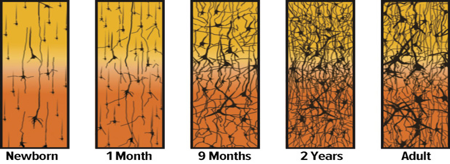Month 36
Genes provide a blueprint for the brain, but a child’s environment and experiences carry out the construction.

A single cell can connect with as many as 15,000 other cells! Synaptic density reaches its peak during the third year, up to 200 percent of its adult level.
- Better able to use the past to interpret present events.
- Better understanding of cause and effect.
Especially vulnerable to persistent negative influences during this period and vice versa; positive early experiences have a huge effect on children’s chances for achievement, success, and happiness.

Rethinking The Brain
| Old Thinking | New Thinking | |
|---|---|---|
| Brain Development | Depends on what you were born with (nature) | Depends on what you are born with and experience (nature and nurture) |
| Experiences before age 3 | Have limited impact | Have a decisive impact on nature and extent of adult capacities |
| Relationship with caregiver | Creates a favorable context for early development and learning | Don’t just create a context, they directly affect the way that the brain is ‘wired’ |
| Brain Development | Is linear and grows steadily | Is non-linear where 3-5 is the magic window of development |
| A toddler's brain is... | Much less active than the brain of a college student | Twice as active as an adults' by age 3 |

How I think @ 36 months
My brain is in an overactive mode at this age. I am observing and absorbing at an astounding rate. Here is how my faculties are developing at this stage.
Motor Development: Gross Motor Skills
• I walk with an agile, almost adult style
• I can run around obstacles
• I can catch large balls and throw overhead
• I can climb ladders; use slide independently
Motor Development: Fine Motor Skills
• I assemble simple puzzles
• I can manipulate clay; finger paints
• I can copy simple shapes, such as a cross or circle
• I can stack blocks up to nine high
Language and Thinking Development
• I understand most of what is said and 75 percent of speech is understandable
• I am getting better at speaking clearly, speaking in complete sentences of three to five words
• I can ask a grammatically correct question
• I match pictures to objects
Social and Emotional Development
• I follow simple directions; enjoys helping with household tasks
• I have begun to recognize own limits — ask for help
• I like to play alone, but near other children
• I am curious about other people’s emotions and have begun to notice other people's moods and feelings
Activities
Disclaimer: This presents an overview of child development. It is important to keep in mind that the time frames presented are averages and some children may achieve various developmental milestones earlier or later than the average but still be within the normal range of development. This information is presented to help parents understand, at a high level, what to expect from their child. Any questions/concerns you may have about your child’s development should be shared with your doctor.




